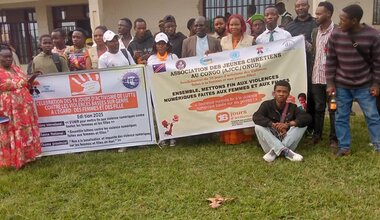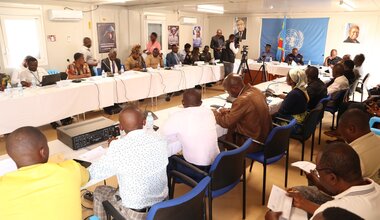HIV/AIDS Section of MONUSCO trains Peer Educators in Beni
Beni, 18 October, 2015 –
A five-day training workshop on HIV Peer Education has ended in the North Kivu Provincial town of Beni, in the Democratic Republic of the Congo (DRC). The training workshop, organized by the HIV/AIDS Section of MONUSCO in collaboration with the Military Training Cell took place from 13 to 17 October at the Nepalese Battalion (NEPBATT) Head Quarters. Participants at the workshop were drawn from the Nepalese, Malawian, and Tanzanian Battalions based in Beni.
At the opening ceremony, the NEPBATT Commander said that HIV and AIDS remain a major threat to both the military and the civilian population. While acknowledging the importance of Peer Education in the fight against HIV and AIDS, he reassured the participants that he would provide assistance to the newly trained Peer Educators, so that the fight against the epidemic would be effective in his area of command.
"Peer education is one of the most effective methods of preventing HIV and AIDS", he said as he urged all the participants to make good use of the training working. "I hope that the knowledge and skills you will gain during the five days of this training will help you to better sensitized others during your activities", the Commander continued. "I want to extend my sincere gratitude and appreciation to the HIV/AIDS Section for organizing this very important training workshop", he concluded.
During the five days of intense activities, participants were drilled on various topics including the basic knowledge of HIV, its impact on humanity, the preventive measures of HIV and sexually transmitted infections and the importance of correct and consistent use of condoms, the UN Code of conduct for Peacekeepers, HIV risk assessment, and how to conduct an effective training. Before the workshop wrapped up, participants translated training documents and sensitization materials into some major local languages spoken in Nepal, Tanzania, and Malawi.
At the closing ceremony, Mory Toure, representing MONUSCO Head of Office in Beni, said that the United Nations recognizes HIV peer education as an instrumental preventive method that can bring about change in behaviour and attitude of peacekeepers. He said that the support of MONUSCO to the fight against HIV and AIDS was one of the basic ways to enable peacekeepers carry out their assignments with confidence and care. Toure encouraged the newly trained Peer Educators to remain professional, objective, and to use their skills to sensitize and train more peacekeepers.
While acknowledging the contribution of the HIV/AIDS Section in promoting awareness in the Mission Area, he remarked that MONUSCO attaches great value to the role of HIV peer education in promoting the wellbeing of the peacekeepers and the host population. He underscored the need for Peer Educators to take advantage of the training workshop and to develop more sensitization activities.
On behalf of the HIV/AIDS Section, the training team gave an overview of the training context within the Mission Area - explaining that the training of Peer Educators was to bring about sustainable HIV prevention. And that the training has a strong impact on the fight against HIV, because it can easily bring about change in behaviour and attitude of individuals.
By Joseph Tabung Banah in Beni
 UN
UN United Nations Peacekeeping
United Nations Peacekeeping



